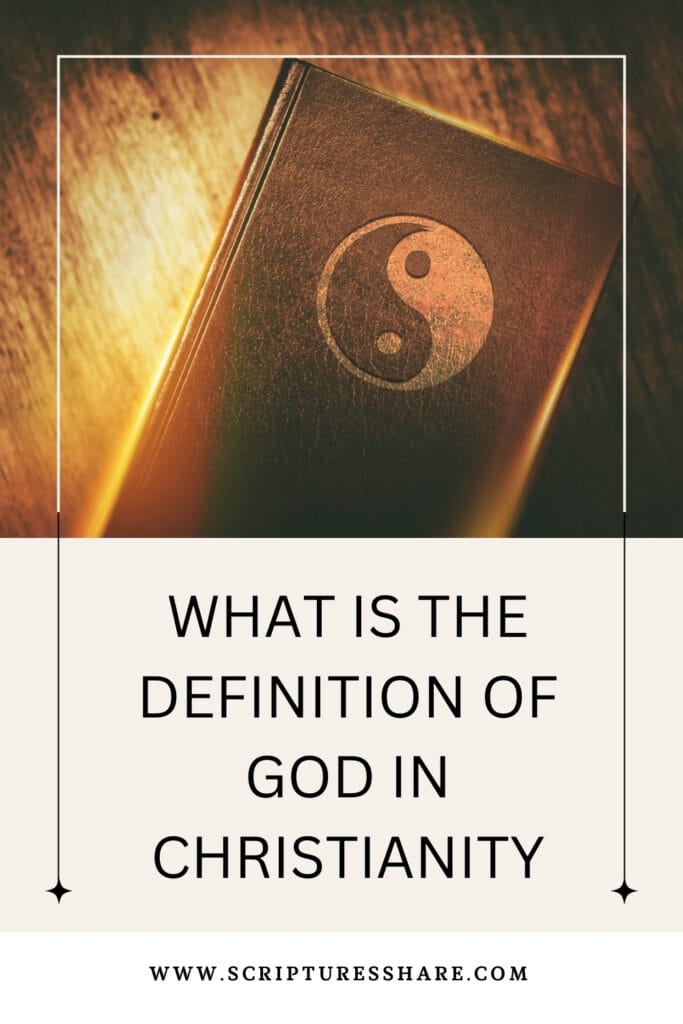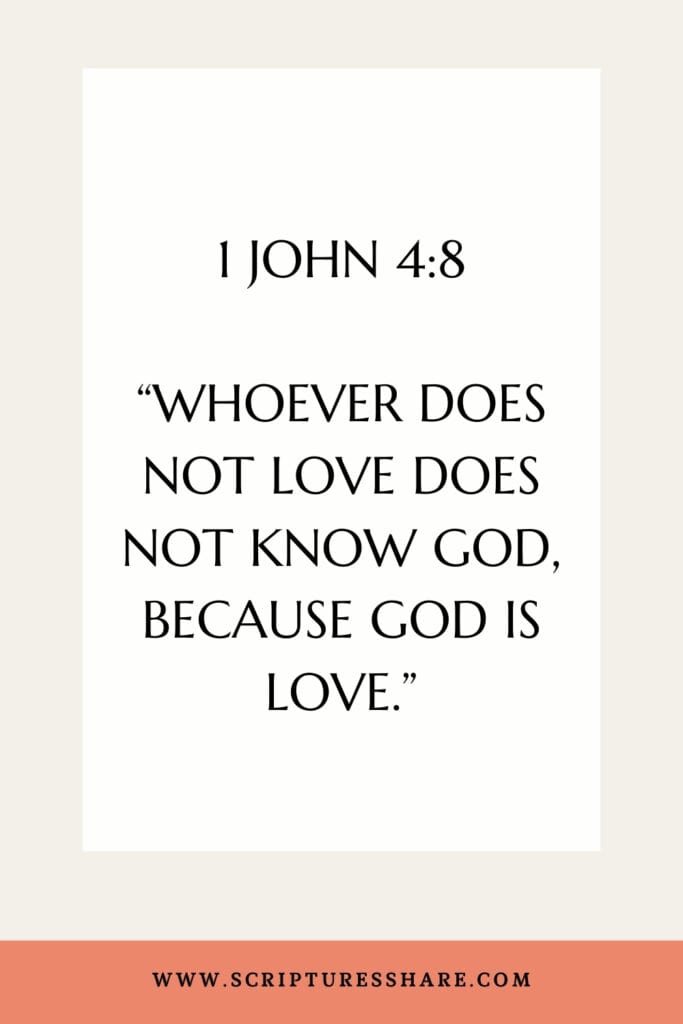No products in the cart.
What Is The Definition Of God In Christianity
This post contains paid and/or affiliate links. I make a small commission at no extra cost to you. Please see our Privacy Policy.
In Christianity, God is seen as the eternal, supreme being who created and keeps everything going. Christians believe in a God who is both beyond the world and part of it. This view of God’s nature and qualities is key to Christian theology and helps shape how Christians see God’s relationship with the world and people.
They believe in one God in a Trinity, made up of three unique persons: God the Father, God the Son (also known as Jesus Christ), and God the Holy Spirit. They teach that God is not only beyond the world but also in it.
They believe God loves humanity. This belief rules out ideas that God is the same as the universe (pantheism) but accepts that God the Son took on human nature, a special event called “the Incarnation.”

An Overview of the Christian Concept of God
Like Jews and Muslims, Christians and Jews follow the story of Abraham. Abraham was in the Christian concept of God as a single, supreme being. This belief in monotheism—one God— was the first to be key in the Abrahamic religions. Christians and Jews see their connection to God through the Hebrew Bible, also known as the Old Testament.
The Christian concept of God holds that this divine creator rules the universe. He has been interacting with Abraham’s descendants for thousands of years. Christians believe this one God made and keeps everything in existence. He is the ultimate ruler and authority.
| Attribute | Description |
|---|---|
| Monotheism | The belief in a single, all-powerful God |
| Creator | God is the source and sustainer of all creation |
| Ruler | God is the supreme authority and sovereign over the universe |

The Trinitarian Nature of God
Christian theology centers on the deep idea of the Trinity. It says God is three unique yet unified beings: the Father, the Son, and the Holy Spirit. Though not directly stated in the New Testament, this belief is based on scripture and has been a key part of Christian belief for many years.
The Father, the Son, and the Holy Spirit
The Father, the Son, and the Holy Spirit are seen as fully divine, always existing together, and equal in power. The Father is the first of the Trinity, creating and ruling the universe. The Son, known as the Word or Logos, became human as Jesus Christ. The Holy Spirit is the third, guiding and empowering believers.
The Incarnation of God the Son
The Incarnation means the Son of God, the second in the Trinity, became fully human yet kept his divine nature. This belief is crucial to Christianity. It shows that God the Son became human in Jesus Christ, connecting the divine and human worlds.
“The Word became flesh and made his dwelling among us. We have seen his glory, the glory of the one and only Son, who came from the Father, full of grace and truth.” – John 1:14
The beliefs in the Trinity and the Incarnation are key to Christian theology. They help us understand God and our relationship with Him.
God’s Attributes and Characteristics
For centuries, Christians have explored and reflected on God’s nature. They believe God has unique attributes and characteristics that make Him stand out. They see God as eternal, beyond time, and deeply involved in our lives.
The Eternal, Transcendent, and Immanent Nature of God
Christians say God is eternal, living outside time. He is seen as the first cause, existing before our universe began. This is shown in the Bible, where God is called the “Alpha and Omega, the beginning and the end” (Revelation 21:6).
God is also seen as transcendent, separate from the world we live in. However, He is also immanent, actively participating in creation and our lives. This mix of being apart and involved is a key idea in the Christian faith. It shows God’s greatness and closeness to us.
| God’s Attributes | Description |
|---|---|
| Eternal | Existing outside the constraints of time, the first cause, the uncaused cause |
| Transcendent | : Wholly independent of and removed from the material world |
| Immanent | Actively involved in the affairs of creation and in the lives of individual believers |
God’s nature, seen as eternal, transcendent, and immanent, has been deeply studied and debated in Christianity. These ideas capture the mystery and grandeur of God. They show a God who is both far away and very close to us.

What Is the Definition of God in Christianity
The Bible is the core text of Christianity. It offers a deep look at God’s nature and role. It says God’s existence is clear from the beauty of creation and our own consciences. The Bible doesn’t try to prove God exists; instead, it shows us God’s attributes, character, and actions.
The Biblical Understanding of God’s Nature and Role
The Bible calls God the Supreme Being, the Creator and Ruler of all, that is, the Self-existent One who is perfect in power, goodness, and wisdom. It says God is a spirit, endless, beyond compare, unchanging, everywhere present, knowing all, and all-powerful. The Bible also talks about God’s traits like justice, love, truth, holiness, compassion, mercy, and grace.
- God as the definition of God in Christianity, is the Supreme Being and Creator of the universe
- The biblical understanding of God as a spirit, infinite, unchanging, and all-powerful
- God’s nature as characterized by justice, love, truth, holiness, and other divine attributes
- The role of God as the Ruler and Sustainer of all creation
This view of God’s nature and role is key to the Christian faith. It gives us a rich picture of the Almighty. This picture guides the faith and lives of believers all over the world.
The Development of Christian Theology
The roots of Christian theology go back to the early Christian teachings, which discussed one supreme God and Jesus’ divinity. These ideas would later shape the Trinity doctrine.
Some early groups, like the Jewish-Christian Ebionites, didn’t accept Jesus as fully God at first. But most Gentile Christians came to see him as divine. This difference led to a split between early Christianity and Judaism.
Early Christian Views and the Formulation of the Trinity Doctrine
From the late 2nd century to the early 4th century, Christian theology grew and changed. This was when the doctrine of the Trinity started to take shape. It says God is a being of three parts: the Father, the Son, and the Holy Spirit.
“The doctrine of the Trinity is the central dogma of classic Christian theology.”
Creating the Trinity doctrine was hard and sometimes led to disagreements. Yet, it became a key part of Christian theology. It’s now a main belief of most Christian groups.

God’s Relationship with Humanity
Christianity and Judaism believe God has maintained a deep bond with Abraham’s descendants for thousands of years. The Hebrew Bible details this bond, which shows God’s constant love for us.
God became human through Jesus Christ, creating a bridge between heaven and earth. This bridge lets us ask for forgiveness, be reconciled with God, and find eternal life. The Bible shows God’s deep love for us and His plan to save us from sin and death.
God wants to combine the divine and human lives into one. This idea is shown through the Tree of Life, where we join with Christ. This way, we become one with God.
| Covenant | Redemption | Relationship |
|---|---|---|
| The Abrahamic religions believe in a covenant between God and humanity, recorded in the Hebrew Bible. | Through Jesus Christ, God has provided a way for the forgiveness of sins and the redemption of mankind. | The Bible reveals God’s deep love and desire for a relationship with humanity, as well as His plan for redemption. |
“I will be their God, and they will be my people. I will make an everlasting covenant with them: I will never stop doing good to them, and I will inspire them to fear me, so that they will never turn away from me.” (Jeremiah 32:38-40)
The bond between God and us is key in the Abrahamic faiths. It shows God’s constant love and His wish for a deep, lasting connection with those He cares about.
The Significance of Jesus Christ
At the core of Christian belief is the deep meaning of Jesus Christ. He is the Son of God-made flesh, connecting the divine and human worlds. His life, death, and rising again offer a way for us to be forgiven, reconciled with God, and saved for eternity.
The study of Christology helps us understand Jesus’ nature and role. Jesus shows us what God is like, being the full revelation of God’s character. By studying Jesus’ life and teachings, we learn how Jesus connects God and humans.
Jesus is the Bridge Between God and Humanity
God became human in the Son, linking the divine and human in love. This act made Jesus the bridge between God and us. Through Him, we find forgiveness, reconciliation, and eternal life.
“For in Christ all the fullness of the Deity lives in bodily form.” (Colossians 2:9)
Looking at Jesus helps us see God’s true nature and character. Jesus’ life, teachings, and sacrifice show us the significance of Jesus Christ as a bridge between God and us.

God’s Works and Plan for Redemption
As Christians, we can’t fully grasp God without looking at His works. What God does shows who He is. The Bible shows us that God’s works are many and come from His true nature and purpose.
God created the world and continues to do so. His biggest work is saving us from sin and death, which He accomplished through Jesus Christ’s life, death, and resurrection.
- Through Jesus, God draws people to Himself, offering them salvation and eternal life.
- God also disciplines His children, helping them become holy and closer to Him.
- Finally, God will judge the world, ending all and starting a new heaven and earth.
The scope and significance of God’s works are amazing. They show His love, power, and control. By looking at these works, we learn more about God’s plan for redemption and our role in it.
Conclusion
The Christian view of God is deep and complex, and it has been key to the faith for ages. Christians see a single, eternal God as the universe’s Creator and Ruler. This God is a Trinity of three—the Father, the Son, and the Holy Spirit—each with a special role for humans.
God shows Himself through His actions and traits and through His Son, Jesus Christ. The Bible is the main source for knowing God, telling about His nature, character, and plan to save us. This belief guides Christian worship, theology, and how God relates to us.
In short, Christians see God with awe, respect, and trust. He is a Being beyond us yet deeply involved in our lives. Through Jesus Christ’s sacrifice, He offers salvation and a way to eternal life. This view of God is crucial to the Christian faith, influencing the beliefs and actions of millions globally.
FAQ
What is the definition of God in Christianity?
God is seen as the eternal, supreme being who made and keeps everything. Christians see God as both beyond the world and part of it. They believe in one God in three forms: Father, Son, and Holy Spirit.
What are the foundational beliefs about God in Christianity?
Christians see God as one being who made and rules the universe. They look up to Abraham as a key figure who believed in one God. Abraham had a deep connection with God.
What is the Trinitarian nature of God in Christianity?
Christians believe in a God that is one yet three: Father, Son, and Holy Spirit. This idea of the Trinity grew in the early days of Christianity.
What are the attributes and characteristics of God in Christianity?
Christians say God is eternal, beyond the world, and in it. God is seen as infinite, unmatched, unchanging, everywhere, all-knowing, and all-powerful. He has many qualities like justice, love, truth, and mercy.
How is God’s nature and role described in the Bible?
The Bible says God is the top being, making and ruling everything. It calls Him the Self-existent One, perfect in power, goodness, and wisdom. The Bible also talks about God as a spirit and His qualities and actions.
How did the Christian understanding of God develop over time?
Early Christianity showed God as one being and Jesus as divine. The late 2nd to 4th centuries saw big growth in understanding God, especially the Trinity.
What is the relationship between God and humanity in Christianity?
Christians believe God always talked to Abraham’s line. Through Jesus Christ, God made a way for humans to connect with Him. This allows for sin forgiveness, making peace with God, and eternal life.
What is the significance of Jesus Christ in the Christian understanding of God?
Christians think Jesus Christ is God in human form, showing God’s true nature. Jesus acts as a link between God and people, offering forgiveness and salvation.
How does the Christian understanding of God’s works and plan for redemption?
Christians believe God made the world, keeps it going, and has a plan to save humans from sin and death. He did this through Jesus Christ’s life, death, and rising again.













